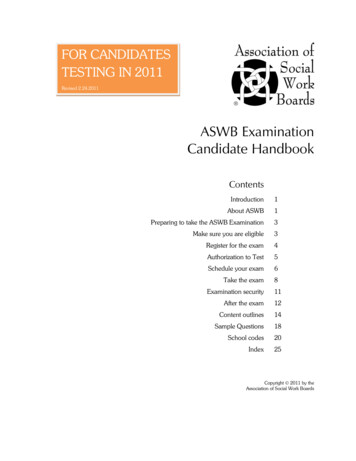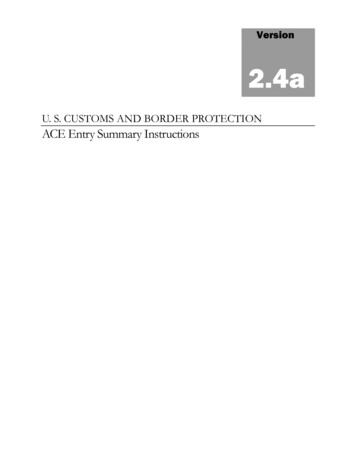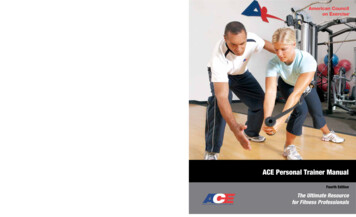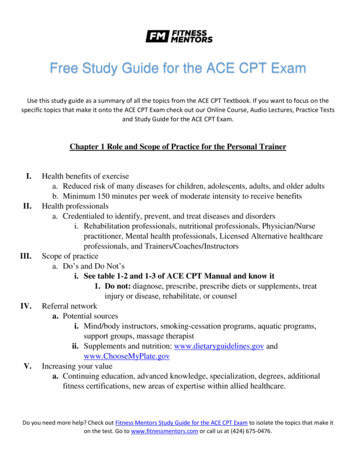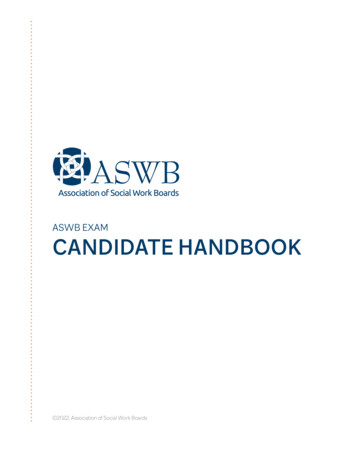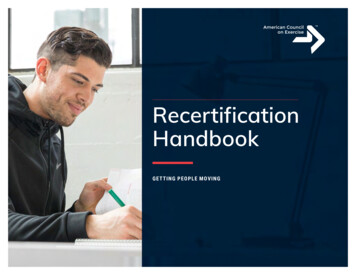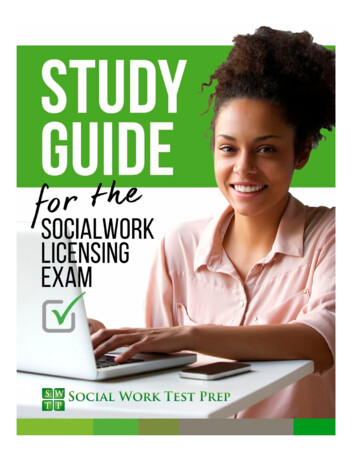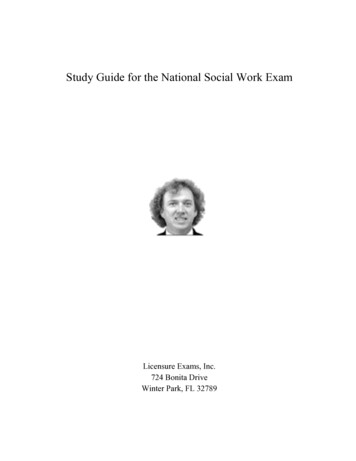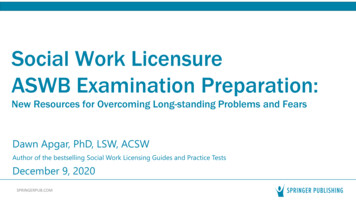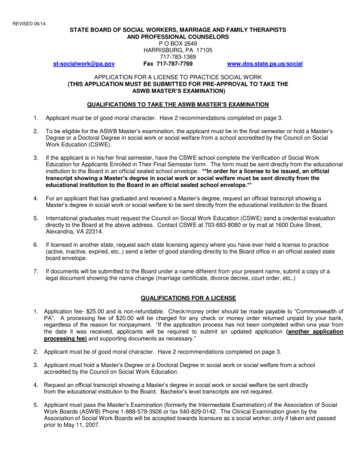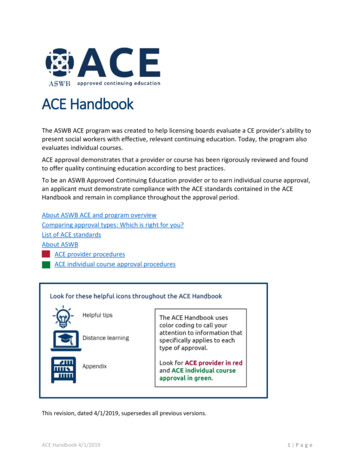
Transcription
ACE HandbookThe ASWB ACE program was created to help licensing boards evaluate a CE provider’s ability topresent social workers with effective, relevant continuing education. Today, the program alsoevaluates individual courses.ACE approval demonstrates that a provider or course has been rigorously reviewed and foundto offer quality continuing education according to best practices.To be an ASWB Approved Continuing Education provider or to earn individual course approval,an applicant must demonstrate compliance with the ACE standards contained in the ACEHandbook and remain in compliance throughout the approval period.About ASWB ACE and program overviewComparing approval types: Which is right for you?List of ACE standardsAbout ASWBACE provider proceduresACE individual course approval proceduresThis revision, dated 4/1/2019, supersedes all previous versions.ACE Handbook 4/1/20191 P a g e
Contents1. Meeting regulatory requirements . 4Standard 1.1 – Regulations . 42. Applying social work values and ethics. 5Standard 2.1 – Values and ethics . 5Standard 2.2 – Nondiscrimination . 5Standard 2.3 – Cultural awareness and diversity . 5Standard 2.4 – Accessibility . 63. Working with ACE . 7Standard 3.1 – Application eligibility . 7Standard 3.2 – Provider staff . 7Standard 3.3 – Continued compliance. 94. Ensuring course quality and relevance . 11Standard 4.1 – Acceptable topics . 11Standard 4.2 – Bibliography . 15Standard 4.3 – Learning objectives. 15Standard 4.4 – Content level . 16Standard 4.5 – Instructor qualifications . 17Standard 4.6 – Instructional materials . 18Standard 4.7 – Avoiding commercial bias. 18Standard 4.8 – Calculating CE credit . 19Standard 4.9 – Pilot testing. 20Standard 4.10 – Posttesting . 225. Delivering learning experiences . 23Standard 5.1 – Course delivery . 23Standard 5.2 – Distance learning communication. 24Standard 5.3 – Cosponsorship . 24Standard 5.4 – Conferences . 286. Promoting and advertising. 31Standard 6.1 – Promotional materials . 31Standard 6.2 – ACE approval statement . 33ACE Handbook 4/1/20192 P a g e
7. Administering the CE program and courses . 36Standard 7.1 – Online security. 36Standard 7.2 – Addressing grievances . 36Standard 7.3 – Record keeping . 37Standard 7.4 – Course evaluation . 38Standard 7.5 – Attendance documentation . 39Appendix . 42ACE Handbook 4/1/20193 P a g e
1. Meeting regulatory requirementsStandard 1.1 – RegulationsThe CE provider knows and adheres to social work regulations regarding CE requirements in thejurisdictions where it offers ACE credit.Program requirements for meeting Standard 1.1 For each jurisdiction where CE credit is offered, CE providers must stay current ono Course content requirements, categories, scope of practice, and professionalskill levels within the jurisdictiono License renewal requirements (e.g., specific content requirements, ethicsrequirements, etc.)o CE requirements for licensecategoriesProviding CE credit to professionsCE providers musto Plan and implement programs andoutside of social worklearning activities in response to an ASWB ACE standards areidentified needdesigned to align social worko Designate the category of CEcontinuing education with mostoffering (clinical, ethics, culturalcompetency, or other) needed forregulatory requirements andcertificates of credit if required byrestrictions of social workthe jurisdiction where CE credit islicensing boards/colleges in thebeing offered or as required byUnited States and Canada.ASWB ACE for all approved ACE does not track whetherindividual courses/conferencesother professions’ licensingo Define potential learners and theboards (such as marriage andtarget audience, identifyingfamily therapists, professionaleducational level and anyclinical counselors, andprerequisites for each CE activity andpsychologists) accept CE creditincluding that information onfor their licensees for individualpromotional materialscourses approved by ACE orWhere ACE requirements are more stringentcourses offered by an ACEthan those of a specific jurisdiction, providersmust follow ACE standards if offering ACE CEprovider.credit for a continuing education training. CE providers must not state inadvertising that ACE approval isgranted for professions otherASWB maintains a social work regulation webthan social work.page where CE providers can look up regulatoryboard websites.ACE Handbook 4/1/20194 P a g e
2. Applying social work values and ethicsStandard 2.1 – Values and ethicsThe CE provider’s overall programs and individual courses and conferences adhere to the socialwork profession’s values and codes of ethics.Essential details for understanding Standard 2.1 The mission of the social work profession is rooted in the following core valueso Serviceo Social justiceo Dignity and worth of the persono Importance of human relationshipso Integrityo CompetenceRefer to the NASW Code of Ethics (2017) and the CASW Code of Ethics (2005).Standard 2.2 – NondiscriminationThe CE provider does not discriminate against any individual or group based on gender, race,creed, national origin, sexual orientation, religion, age, organizational membership, or anyother basis prohibited by law or counter to the social work profession’s codes of ethics.Essential detail for understanding Standard 2.2 Refer to the NASW Code of Ethics (2017) and the CASW Code of Ethics (2005).Program requirements for meeting Standard 2.2 CE providers must use the social work profession’s values and codes of ethics to definediscrimination. In cases where an action is lawful but is counter to the social work codesof ethics, CE providers must follow the codes of ethics.CE providers must not require program participants to accept or adhere to any religion,religious principles, creed, or political principles.CE providers must not require membership in a particular organization as a prerequisitefor participation.Standard 2.3 – Cultural awareness and diversityThe CE provider infuses cultural awareness and diversity into its courses and programs.Program requirements for meeting Standard 2.3 CE providers must ensure that their continuing education courses promote culturalawareness and understanding of diversity such as defined in the NASW Standards andIndicators for Cultural Competence in Social Work Practice, 2015.ACE Handbook 4/1/20195 P a g e
A CE provider’s social work consultant must assess courses offered for ACE credit toensure they meet this standard. Providers of approved individual courses/conferencesmay use a social work planner or planners instead to review individual courses to ensurethey meet this standard if they do not have a social work consultant. See Standard 3.2Standard 2.4 – AccessibilityThe CE provider offers accommodations and accessibility as required by law.Essential detail for understanding Standard 2.4 CE providers are responsible for meeting the legal requirements for accessibility in thejurisdiction(s) where they offer courses and for obtaining legal counsel to make surethey understand how accessibility laws apply to their organization when makingaccommodation decisions.Program requirements for meeting Standard 2.4 CE providers offering courses in the United States must make accommodations requiredby applicable laws related to individuals with disabilities.CE providers offering courses in Canada must follow all applicable laws related tohuman rights legislation in Canada.CE providers must include clear instructions for requesting accessibilityaccommodations in promotional and advertising materials.ACE Handbook 4/1/20196 P a g e
3. Working with ACEStandard 3.1 – Application eligibilityProspective applicants must meet eligibility requirements prior to applying.Program requirements for meeting Standard 3.1 To be eligible to apply for ACE provider or course approval, a prospective applicant musto Have been operational for at least six months.o Have planned and presented at least three educational activities appropriate forsocial workers.o Designate an individual with appropriate experience to serve as continuingeducation director responsible for working with ACE.o Designate a licensed/registered social worker who will serve as social workconsultant, involved in the planning, implementation, and monitoring of social workcontinuing education. (A social work planner or planners may serve this function forapproved individual courses/conferences. See Standard 3.2)o Be able to supply evaluations and documentation of its program.If you are applying to become an ACE provider, get application forms fromthe ACE provider appendixIf you are applying for individual course approval, get application forms fromthe ACE individual course approval appendixStandard 3.2 – Provider staffThe CE provider has assigned staff members to the roles of continuing education director, socialwork consultant, and primary contact to work with the ACE program during the applicationprocess and after approval to ensure continued compliance with ACE standards.Program requirements for meeting Standard 3.2 CE providers must assign a continuing education director who is a visible, identifiableauthority within the organization and who remains in good standing with theappropriate regulatory body if the individual has a professional license in any field.o The CE director Oversees the provider’s application process with ACE, explaining theprovider’s mission and goals for the provision and evaluation ofcontinuing education on the ACE application Ensures that the provider’s programs and cosponsored programs meetACE standardsACE Handbook 4/1/20197 P a g e
Demonstrates administrative stability, oversees transitions and staffingchanges within the provider organization, enacts procedures for thesmooth and orderly transfer of administrative responsibilities in theevent of an administrative change, and takes steps to ensure familiaritywith ASWB standards Responds promptly to requests for information from ACE staff Informs ACE staff when changes occur in the provider organization Updates information following changes to administrative staffresponsibilities, contacts, company address, website address, andtelephone number Notifies ACE if the provider’s company is sold and completesrequired documentation Provides written notification to ACE within 10 days of changes tothe individual serving as CE director or social work consultant,including updating resumes, license information (if applicable),and contact informationCE providers must assign a social work consultant to participate in and monitor theplanning and implementation of the provider’s courses.o The social work consultant May not also serve as the CE director unless ACE grants an exception Must be licensed as a social worker and have practiced or be currentlypracticing social work privately or within an institutional setting Must remain in good standing with the appropriate regulatory bodyduring the duration of ACE individual course or provider approval. If thesocial work consultant’s license status ends for any reason, the providermust designate another qualified individual to serve as the SWCo The social work consultant is involved in Assessing the educational needs of social workers to inform coursedevelopment Reviewing or developing learning objectives Planning the provider’s continuing education courses Administering and monitoring the provider’s courses Working with other staff to stay current on the CE requirements in alljurisdictions for which CE credit is offered (Standard 1.1) Ensuring the provider infuses cultural awareness and diversity intocourses and the overall program (Standard 2.3) Resolving grievances (Standard 7.2) Evaluating the provider’s courses and program (Standard 7.4)o CE providers applying for individual course or conference approval may assign alicensed social worker as a social work planner for each course or conferencesession submitted instead of a social work consultant. The social work planner isresponsible for the same functions as the social work consultant for each courseto which they are assigned. ACE Handbook 4/1/20198 P a g e
CE providers must assign a primary contact to ensure effective communication betweenACE and the provider’s CE director and social work consultant.o The primary contact May be the CE director, the social work consultant, or another individualassigned to this role. Makes sure that the CE director and the social work consultant review allreports and requests for additional information from ACE and submitsany revised material or additional information requested accurately andon time. Before the primary contact sends a response back to ACE forreview, all areas in need of correction or revision must be addressed. Notifies the CE director and the social work consultant of all informationsubmitted to ACE.o If the primary contact is not the CE director and ACE determines that the primarycontact is not meeting these responsibilities, ACE may require the CE director toassume this role or to assign a new individual.CE providers must assign an auxiliary social work consultant or advisory committeewhen ACE grants an exception allowing the same person to serve as both the socialwork consultant and the CE director or when an individual course or conferenceapplicant has only one social work planner. This individual or committee must beavailable to consult with the CE director when needed to mediate a dispute or givesupport during resolution of a complaint.Personnel change form and instructionsOrganization contact information change formOrganization name change form and instructionsClosing or selling the business form and instructionsStandard 3.3 – Continued complianceThe CE provider ensures that its program and courses meet current ACE standards.Essential details for understanding Standard 3.3 ACE providers will receive an approval letter containing the ACE provider’s official ACEapproval statement (Standard 6.2) and other important and helpful information.After the approval letter is received, the ACE provider may begin offering continuingeducation events for ACE CE credit in the formats for which the ACE provider has beenapproved.CE providers of approved individual courses or conferences will receive an approvalletter containing the course’s official ACE individual course approval statement(Standard 6.2) and other important and helpful information. After the approval letter isACE Handbook 4/1/20199 P a g e
received, the CE provider may begin offering ACE CE credit for the approved individualcourses or conference sessions in the approved formats.CE providers who are approved for individual courses or conference sessions may notmake changes to approved courses or conference sessions without submitting a changeapplication to ACE and getting approval for the change(s).Failure to comply with ACE standards or respond to requests in a timely manner maysubject the CE provider to adverse action by ACE including probation, suspension, orrevocation of approval. ACE reserves the right to remove ACE approval at any time ifACE staff determine that a provider or course is not meeting ACE standards.ACE will notify CE providers as far in advance as possible of changes to standards orrequirements via newsletters, emails, or the ACE page on the ASWB website.Program requirements for meeting Standard 3.3 Backdating of approval for courses or conferences offered before ACE approval wasgranted is prohibited.Every course offered for CE credit to social workers by CE providers using ACE provideror individual course approval must meet ACE standards.CE providers must update their courses and program to continue to comply with currentACE standards throughout the provider’s or course’s approval period. CE providers mustupdate their materials to meet current standards whenever the ACE Handbook isrevised. Exception: In some cases, CE providers may be required to make immediatechanges to their courses to remain in good standing. This may occur when an ACEstandard must be changed or created to remain in compliance with social workregulations.Courses approved through individual course approval may not be changed during thetwo-year approval period. The provider must request approval from ACE and pay achange fee for all changes, including content, instructors/speakers, title, etc. Only minorchanges are permitted; if a provider wishes to significantly change a course, regardlessof the number of changes, the provider must submit it as a new course. If ACE staff findthat a requested change is significant enough to require a new course application, theywill notify the provider that it must pay a new course application fee. The amountalready paid may be applied to the new course application fee, but it will not berefunded.CE providers who have received ACE approval for individual courses or conferencesessions may offer ASWB ACE credit ONLY for the courses/conference sessions thathave been individually reviewed and approved by ASWB ACE.If audited, CE providers must provide ACE staff with requested documentation within 30days. They must comply within 30 days to ACE requests for changes necessary to meetACE standards.CE providers must make changes to materials within 24 to 48 hours of notification of asignificant departure from ACE standards (e.g., removing a course on an unacceptabletopic for social work CE).ACE Handbook 4/1/201910 P a g e
4. Ensuring course quality and relevanceStandard 4.1 – Acceptable topicsThe CE provider offers courses on topics that are relevant to evidence-based social workpractice and reflect current peer-reviewed research, best practices, and the needs of socialworkers.Program requirements for meeting Standard 4.1 Course topics must be pertinent to social work theory, methods, and practice andreflect current research and best practices. Course topics must clearly fall within the scope of practice for social workers and bedirectly applicable to social work practice, relating to one or more of the following socialwork educational areaso Theories and concepts of human behavior in the social environmento Social work practice, knowledge, and skills Social work research, programs, or practice evaluations Social work agency management or administration Development, evaluation, and implementation of social policy Social work generalist practice Social work clinical practiceo Diversity and social justiceo Social work ethicsCourse content should be based on peer-reviewed research, cover evidence-basedpractice, and apply specifically to the needs and the scope of practice of licensed socialworkers. ACE Handbook 4/1/201911 P a g e
ACE Handbook 4/1/201912 P a g e
Courses related to other functions sometimes filled by social workers, such as leadershipor business practices or processes, may not be acceptable for social work CE credit.Training that applies to leaders in any field, even when helpful to social workers inmanagement roles, is not considered acceptable for social work CE credit unless thecourse includes learning objectives specific to social workers.Course topics that are primarily procedural or oriented toward business practices, selfhelp, or self-development are not acceptable for social work CE credit.ACE Handbook 4/1/201913 P a g e
Determination of the appropriateness of a course must not be made based on topicalone. The provider must adequately establish the connection between coursecontent and one or more of the social work educational areas. The more distant atopic appears from core disciplinary knowledge, the greater the responsibility of theCE provider to ensure that the CE is relevant to licensed social workers. CE providers must review and update course content and instructional materials forcurrent content and update them regularly (at least every 5 years).o When a CE provider determines that course content is no longer current or valid,the provider must either updatethe course or retire it.o CE providers must regularlyMultidisciplinary coursesupdate the course bibliographywith current references toCE providers may offer courses for social workdemonstrate validity andCE that were originally developed for othercurrency even when courseprofessions if they include content appropriatecontent and material do notfor social workers and meet ACE standards. Suchrequire change. (Standard 4.2)courses must be revised so the course materials,o Courses that include enduringlearning objectives, promotional materials, etc.,materials, such as a recordedare inclusive of social workers. CE providers mustvideo or online reading-basednot offer a course for social work CE that wasmaterial, must list in promotionalcreated for another profession and that includesmaterials the date the courselearning objectives and content that arewas created, reviewed, orinappropriate for social workers or are gearedspecifically to another profession or professions.updated.o Asynchronous distance learningFor example, a course on end of life care(self-paced) courses based solelydeveloped for nurses may include content thaton enduring materials thatwould be valuable to a social worker who is partcannot be updated, such as aof a multidisciplinary team. If the coursebook or article not created by thecontent, course materials, learning objectives,CE provider, must use courseand promotional materials specifically addressmaterial published within thethe nurse’s role, the ethics of nursingpast five years. Providers mustprofessionals and end of life care, or a nurse’seither retire courses withscope of practice, then it would be too focusedmaterial published more thanon the nursing profession to be offered by a CEprovider for social work CE credit.five years prior or add currentwritten material.Developing ethics courses for social workersACE Handbook 4/1/201914 P a g e
Standard 4.2 – BibliographyThe CE provider creates a bibliography, also called a reference list, that includes all sourcematerial used, consulted, referenced, or quoted for each course or conference session.Program requirements for meeting Standard 4.2 The bibliography must include all sources used in the creation of the course, includinginformation from websites, books, journals, articles, reports, charts, videos, etc. Most ofthe references must come from peer-reviewed journals, unless no journal articles areavailable for the content area(s) being covered in the course. In that case, otherreferences must prove the course relates to current evidence-based practice or bestpractice for the social work profession.Participants must have access to the bibliography to determine the credibility andsource of information and to learn more from sources.At least 50 percent or five of the references cited, whichever is less, must reflectresearch published within the past five years. The bibliography must be updatedregularly to ensure courses meet this requirement.If the bibliography includes writings the course instructor authored, it must also includerelevant, current references from writings of other authors.The bibliography’s entries must follow APA format. The Purdue Online Writing Laboffers detailed instructions on formatting these entries.If a reference is from a website that lists no specific date of creation, then the date theCE provider last retrieved the information must be included in the bibliography.Sources that may help participants but were not used in the creation of the course may beshared via a separate list called, for example, “Suggested readings” or “Additional resources.”Standard 4.3 – Learning objectivesThe CE provider offers courses with measurable learning objectives—clear and concise writtenstatements defining the knowledge, skills, and abilities a learner should be able to demonstratefollowing the learning experience—that the provider can evaluate and use to assess andimprove future learning and course quality.Essential detail for understanding Standard 4.3 Learning objectives serve as the foundation for planning, instruction, and assessment ofa learning experience and define the expected goal of the course.ACE Handbook 4/1/201915 P a g e
Program requirements for meeting Standard 4.3 Learning objectives must be written clearly to help participants understand how thecourse is related to their educational goals and focus their attention on specific aspectsof the course content.The effectiveness of the course in helping participants meet the learning objectivesmust be assessed.o For distance learning courses, the learning objectives must beincluded and rated in the pilot test. (Standard 4.9)o A posttest requiring the participant to demonstrate knowledgeis required for self-paced distance learning courses and live distance learningcourses that are not interactive. Posttesting is encouraged for all other courses.(Standard 4.10)The required course evaluation must allow participants to rank learning objectives.(Standard 7.4)Learning objectives must use demonstrable verbs or action words that are measurable.They must state what the learner will demonstrate.ACE does not accept verbs that cannot be demonstrated such as “appreciate,”“believe,” “understand,” “learn,” or “know.” Make sure learning objectives aremeasurable or observable. They should not describe how the learner will learn or whatthe instructor will teach. Learning objectives that were originally written for audiences from other professionsmust be revised to include social workers and the social work profession.Acceptable learning objectives listStandard 4.4 – Content levelThe CE provider accurately identifies content level as beginner, intermediate, or advanced.Essential details for understanding Standard 4.4 Beginning level courses introduce learners to a content area; include informationabout a condition, treatment method, or issue; and involve learning andcomprehending content.Intermediate level courses provide information that builds on knowledgepractitioners with some experience already have. These courses focus on skill-ACE Handbook 4/1/201916 P a g e
building or adding knowledge, possibly following a brief overview of basicinformation, and involve using information in concrete situations and understandingthe underlying structure of the material.Advanced level courses provide content for participants who have been working inthe content area and have a clear understanding of the issues. These courses coverand address the complexities involved in the work and involve synthesizing materialto create new patterns or struc
ACE Handbook 4/1/2019 1 Page . ACE Handbook . The ASWB ACE program was created to help licensing boards evaluate a CE provider’s ability to present social workers with effective, relevant continuing educati
